The All Blacks are doomed at this years World Cup (and it's not Ian Foster's fault)
A cruel draw has dealt what may be a mortal blow to the top sides at this years Rugby World Cup
The fate of the 2019 Rugby World Cup may well have been determined on the tournament's second day. That evening, a dejected Springboks team trudged off Yokohama Stadium, convincingly vanquished by the defending champions and tournament favourite, the New Zealand All Blacks. They knew the history, no team had ever lost a pool game and gone on to win the World Cup. What they probably didn’t know is that no team had survived a tough quarter-final in tournament history and gone on to prevail also. History appeared to be stacked against them, as in the neighbouring Group A, the world number 1-ranked Irish team would now be waiting to face them in the quarter-finals.
At least, that’s what should have happened if everything had gone to script in Group A. But a series of sensational results, with hosts Japan (ranked 10th) beating both Ireland and Scotland (7th), turned the group and the fortunes of the World Cup on its head. Suddenly New Zealand, who thought they’d earned themselves a more favourable draw by winning Group B, faced the prospect of a clash of the top 2 ranked teams in the world, against Ireland. South Africa meanwhile got a far more palatable quarter-final against the 10th-ranked Japanese.
As I’ll demonstrate in this article, these types of vagaries, and the tournament draw in general, have a huge, almost definitive say on who the eventual champion is. The tired old adage that I hear trotted out constantly that ‘the draw doesn’t matter’, and ‘you have to beat everyone to win it anyway’ is simply not true! To win a Rugby World Cup you have to win 3 knockout games on consecutive weekends - the quarter-final (QF), semi-final (SF), and final (F). And the luck of the draw in who you get in these games is absolutely critical to your chances of success. Rugby is a highly physical and competitive contest, and to win 3 crunch matches in a row against top-tier opposition is incredibly hard, in fact almost impossible.
And the data from recent tournaments clearly lays this out:
- The World Cup champions have never faced and beaten 3 teams each ranked higher than 7th in the knockout stages
- Four of the most recent five champions faced the lowest-ranked of the quarter-finalists. (the exception, NZ in 2015, faced the 3rd-lowest ranked QF opponent in 7th-ranked France)
- All five semi-finalists who vanquished the highest ranked QF opponent the previous weekend, subsequently lost their semi-final
Which brings me to this year's tournament. Due to the draw occurring years out from the rugby starting, an unfortunate occurrence has seen the top five ranked current teams drawn on the same side. France (2) and New Zealand (3) are in Pool A. Ireland (1), South Africa (4) and Scotland (5) are in Pool B. The most important part of this is that these pools crossover for their quarter-finals, meaning the winner of Pool A plays the runner up in Pool B, and the Pool B winner faces the Pool A runner up. So it is only possible for
2 of these top 5 teams to progress to the semi-finals.
Let’s look back at the tournament history to see just how hard a tough quarter-final can be. I’ve used the World Rugby rankings at the start of each tournament as a gauge of the relative strength of each team. While there is some controversy about the accuracy of these rankings, they do provide a robust and consistent gauge to measure against. More information on them can be found here: [https://www.world.rugby/tournaments/rankings/explanation] As the rankings were only released in 2003, the analysis is restricted to the last 5 tournaments only (although this is not such a bad thing as the Rugby World Cup has become far more competitive in recent editions). They consist of both a world ranking (from number 1 on down) and ranking points (on a scale of 0 - 100, 100 being the best). The ranking points provide a valuable gauge on the relative strength of opponents over and above the actual world ranking. For example, in 2015 New Zealand (ranked 1st) were 6.2 ranking points ahead of 2nd placed Australia. Meanwhile there were only 0.8 ranking points separating 3rd ranked South Africa and 6th-ranked Ireland, so despite a 4 position difference between South Africa and Ireland in the rankings, a match-up between them would be expected to be extremely close.
What we can see from the chart below is that on average the eventual semi-final winners and losers in all 5 tournaments had very little to separate them in terms of ranking points going into the tournament: 86.7 vs 85.0. The minor difference between these two is not statistically significant.
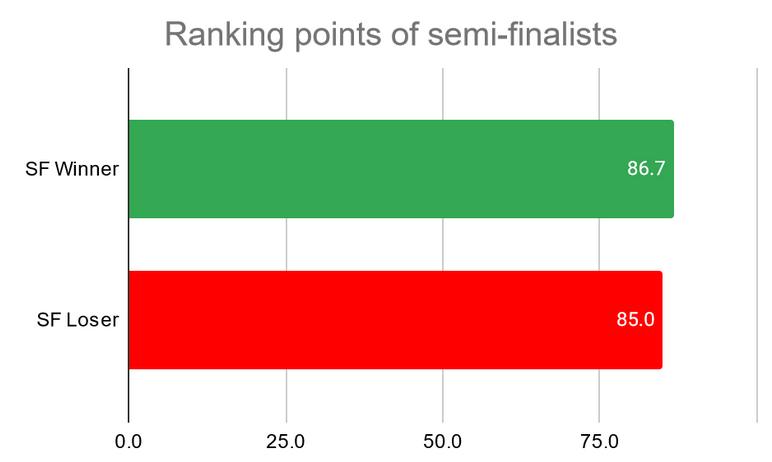
However when comparing the strength of their relative QF opponents, there is a big discrepancy which is statistically significant. The team that went on to win their semi-final enjoyed a quarter-final opponent with just 78.5 ranking points on average. This compares to the semi-final losers, who had the previous week had to overcome a QF opponent averaging 83.6 ranking points.
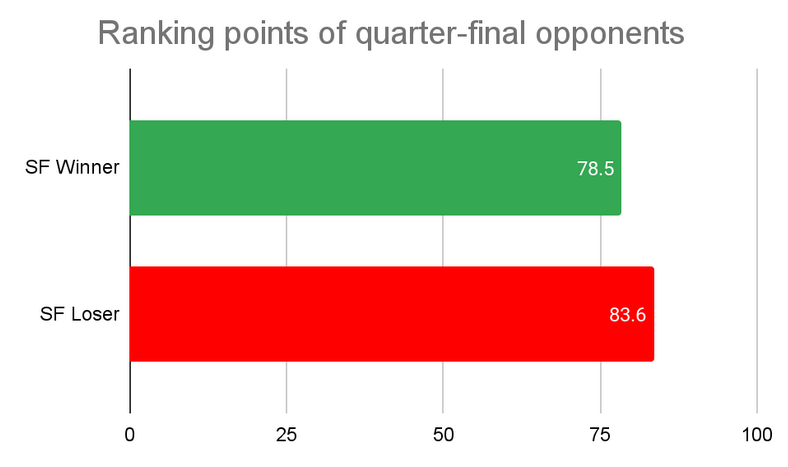
The semi-final winners advantage in terms of ranking points over their QF opponent the previous week is immense, whereas the semi-final losers had faced an opponent of similar relative strength:
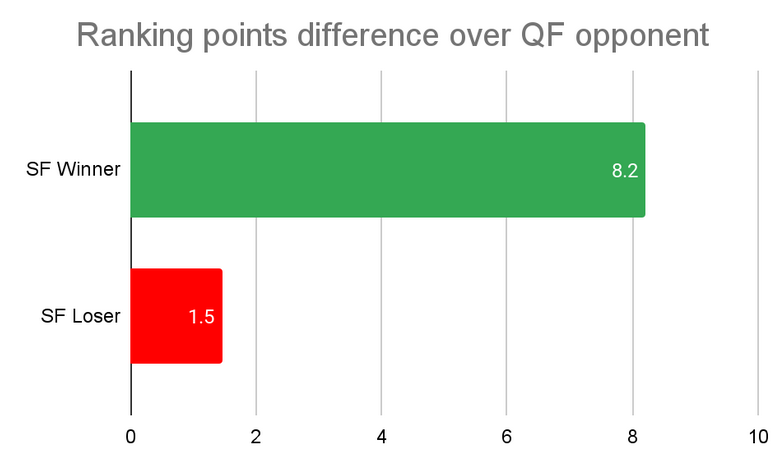
Here are the same charts using the actual World Ranking position, rather than the ranking points:

The semi-final winners had come through quarter-finals against opponents on average 5 places lower than them on the rankings. Semi-final losers on the other hand, had faced quarter-final opponents the previous week that were just 1 place below them in ranking.
So how does this manifest in the big match itself, the final?
The final winner does have a ranking points advantage over the loser of around 5 points, and this is significant:
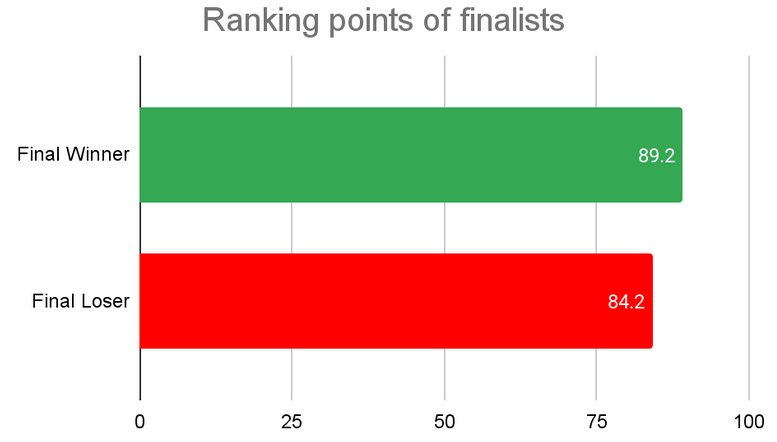
The QF opponent of the final winners was on average 4.7 ranking points worse than the QF opponent that the final loser had to play:
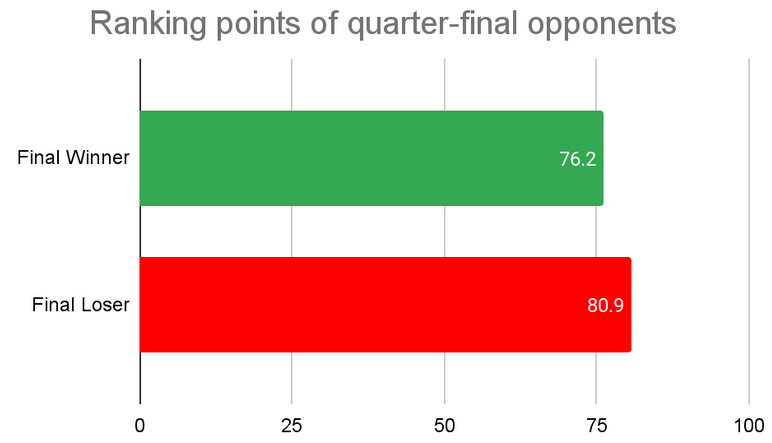
Interestingly, there is no difference at all in the quality of the semi-final opponents between the Final winner and loser:
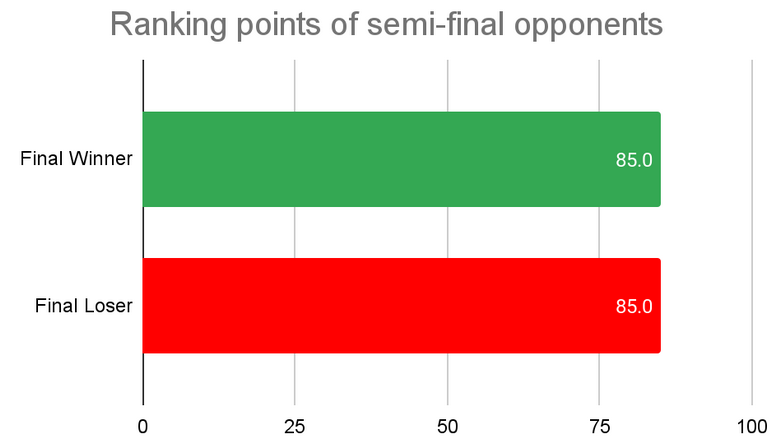
Am I saying that with this tough draw, it’s impossible for Ireland, France, New Zealand, South Africa or Scotland to prevail come November? No, in all likelihood the winner will be one of these teams based on current form. But for each of them, their path to the title has become far, far harder and if I was a betting man, I’d be putting my money on a team from the other half of the draw who have a much easier approach into the semi-finals. Remember, it’s knockout tournament play and you’ve got to be still standing at the end of each week to have a chance of progressing. So the old adage of taking each game as it comes really does count at the business end of a World Cup.


